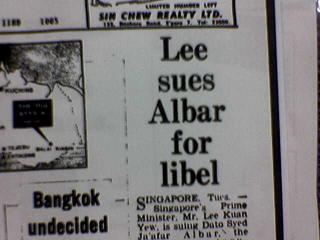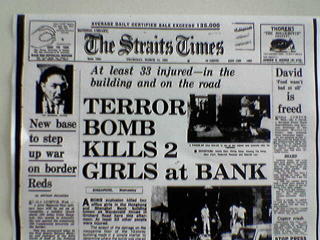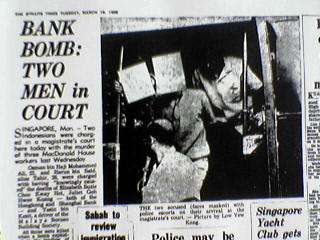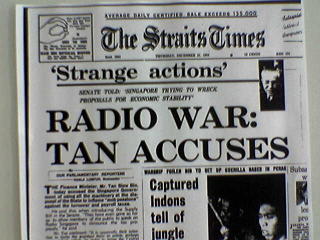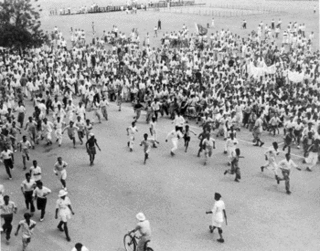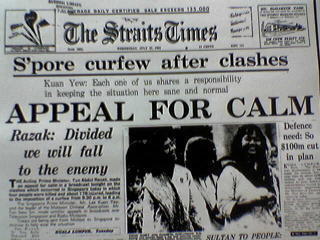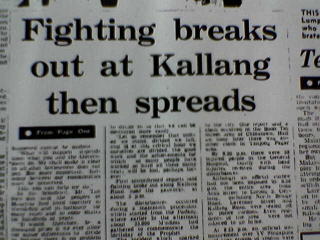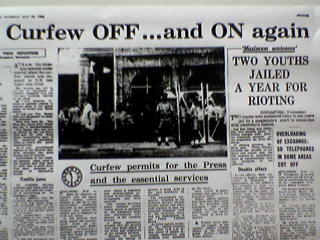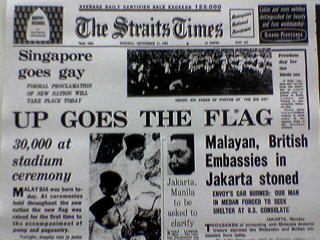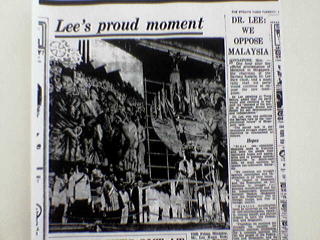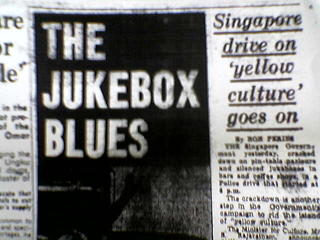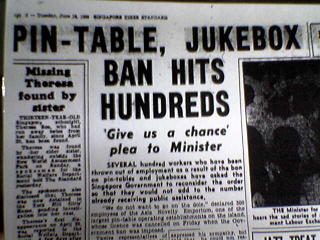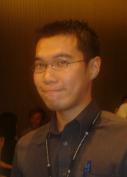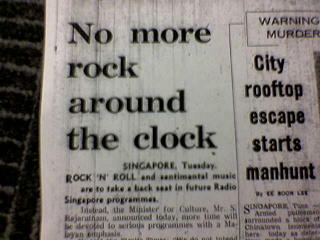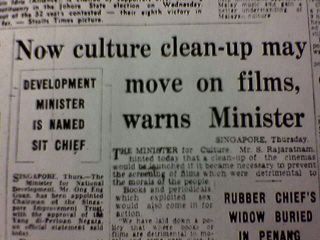Below is an abbreviation of
'50 facts that should change the world', a book by BBC journalist Jessica Williams.
In the foreword, she wrote, "Setting out to change the world is a pretty difficult task. But I firmly believe each one of the 50 facts in this book is capable of changing the way we think - and when it comes to changing the world, that's the most important step we can take."
"Some of the facts need major shifts in thinking, while others require governments to start taking their responsibilities to the international community seriously. A quote from the eminent anthropologist Margaret Mead has inspired activists for generations, 'Never doubt that a small group of thoughtful, committed people can change the world. Indeed, it is the only thing that ever has."
At the end of the book, there is a full list of where the 50 facts are sourced from, and a guide of how one can get involve.
(Italics and links are added)1. ONE in five of the world's population is undernourished.Eight hundred million go hungry every day. Two billion people suffer from chronic malnutrition. Eighteen million die each year from hunger-related diseases. Around half of the deaths of children under five (10 million each year) are associated with malnutrition. Famines occur where there is an acute and extreme shortage of food for a large number of people, but hunger can persist over many years and its long term effects can be just as devastating.
And yet, incredibly, this is not caused by food shortages. The world produces enough food each year to feed all of its inhabitants: if it were shared out evenly, everyone would have enough to eat. So why are many still suffering?
Professor Amartya Sen argues that political circumstances are often to blame. Where a country is already weakened by epidemics or war, natural phenomena like droughts or floods become far more difficult to overcome. Corruption, mismanagement and bad government mean that the country may lack funds to import food when needed - so a food shortage can quickly turn into a famine.
2. EIGHTY-ONE per cent of the world's executions in 2002 took place in just three countries: China, Iran and the USA.Amnesty International notes that in 2002, China executed at least 1,060 people, and that this figure was based on limited records - the Chinese government keeps its executions quiet and seldom publicises them, so the true figure is believed to be far higher. At least 113 executions were carried out in Iran, and 71 people were executed in USA.
China's government has consistently defended its use of the death penalty, calling human rights groups 'irrensponsible.' In the months between April and July 2001, at least 1,781 people were executed. As part a 'Strike Hard' campaign against crime, police and prosecutors were urged not to hold up the judicial process. Courts boasted of their speed and special procedures. Many minor offences became capital crimes : bribery, pimping, stealing petrol and selling unsafe food among them.
One of the most effective ways to force countries to recognise their human rights obligations is international pressure. In its March 2005 decision which declared the execution of minors to be unconstitutional, the US Supreme Court's majority opinion mentioned "the overwhelming weight of international opinion against the juvenile death penalty."
Official information about the use of the death penalty in Singapore is shrouded in secrecy.3. THERE are 44 million child labourers in India, some working 16-hour days.Everyday in India, millions of children who should be at school are sent to work. For almost all of them, it's a matter of necessity. The UN International Labour Organisation (ILO) estimates there are 44 million child workers and unofficial estimates can be as high as 100 million - this is roughly equivalent to the number of children between five and fourteen who are not in school.
Worldwide, the ILO estimates that there are 246 million child labourers aged between five and seventeen. Of those, 171 million are working in hazardous conditions; roughly 8.4 million are involved in forced and bonded labour, armed conflict, prostitution, pornography and other illicit activities.
For many children, doing some work about the house is an introduction into adult responsibilities. A paper round or Saturday job may give them a small amount of financial independence. But as soon as work means children can't be children - that they have no time for school, play, friends - the responsibilities have become too great. And that's when we need to do something about them.
4. LANDMINES kill or maim one person every hour.Landmines were first deployed during the First World War as a means of securing territory. But their cheap price means they are still widely manufactured and used today. Minefields are seldom cleared when wars come to an end, and the charges remain active for many years. Mines also can't discriminate between soldiers and civilians - a fundamental requirement of the laws of war.
In more than 60 countries around the world, landmines litter the earth. One in every 236 Cambodians is an amputee - and they're the lucky ones. Surgeons from the International Committee of the Red Cross assume that up to half of mine victims die instantly or bleed to death unable to reach medical care in time.
Progress is being made. As at December 2004, 144 countries had become parties of the Mine Ban Treaty. Eighteen countries destroyed their stockpiles of mines altogether, and funding for mine clearance leaped 30 per cent to $309 million. However, there are still 42 countries which have yet to sign the treaty, and between them they hold a stockpile of some 180 million mines.
Singapore is one of the fifteen mine producers globally. The Singapore government has never contributed to international humanitarian mine action programs.
5. THE world's trade in illegal drugs is estimated to be worth around 400 billion - about the same as the world's pharmaceutical industry.In 1971, US President Richard Nixon declared drugs to be 'public enemy number one'. Since then, many governments have issued their own campaigns against users, dealers and traffickers, and the phrase 'war on drugs' has entered the lexicon of our times.
On the face of it, there are some persuasive arguments in favour of a prohibitive approach to drugs - if the drug supply lines are cut, users will eventually be forced to give up their habits. Accordingly, it is right for a state to step in to prevent its citizens from harming themselves.
But there's one problem with this analysis : the War on Drugs isn't working.
The UN estimate that 200 million people around the world abuse drugs, and the global trade in illicit drugs is worth $400 billion a year. In other words, the illegal drugs market is worth about the same as the worldwide trade in pharmaceuticals - and it makes up about 8 per cent of all international trade.
Half inmates of Singapore jails are drug offenders 6. ALMOST 30 million Africans are HIV-positive. By 2050 the disease may have claimed as many as 280 million lives.It is the biggest epidemic ever to face humankind, and we are not fighting it well. Every fourteen seconds, a young person becomes infected by the HIV virus. 36 million people are living with HIV or Aids, and by 2050 the disease may have claimed as many as 280 million lives. Sub-Saharan Africa has been hit the hardest. More than 20 million people there have died from Aids, and 12 million children have been orphaned by the disease. Life expectancy is tumbling - by as much as 30 years in some countries.
The executive director of UNAids says that "denial has been a characteristic of this epidemic at all levels." In 1990, the CIA published a report forecasting 45 million HIV infections by 2000, the vast majority of which would be in Africa. It was not until the late 1990s that international institutions started to give priority to the emerging crisis in Africa. China refused to acknowledge the country's Aids problem until 2002, when in single day it revised its HIV infection statistics. One day there 30,000 people living with HIV, the next there were 1 million.
The Global Fund to Fight Aids, Tubercolosis and Malaria needs $2.3 billion to continue its activities through to the end of 2005. UN Secretary-General Kofi Annan estimates $7 - $10 billion is needed each year to address the epidemic in low to middle income countries. Yet the world spends about $2 billion
every day on funding its military efforts.
Singapore facing "alarming AIDS epidemic": govt 7. MORE people die from suicide than in armed conflicts. In the past 45 years, suicide rates have grown by 60 per cent worldwide.In the US, more people die by their own hand than are killed by others - in 2000, there were 1.7 times more suicides than homicides. A study carried out in Britain in 2002 showed that nearly one in six adults had considered attempting suicide at some point of their lives.
In the past 45 years, suicide rates have grown by 60 per cent worldwide. The WHO estimates that a million people died from suicide in 2000, and ten to twenty times more attempted suicide. It is now the biggest cause of death among people aged 16 to 74 worldwide, and kills more people than the world's armed conflicts. It is not just the affliction of the developed world : the former Soviet states of Belarus, Kazakhstan, Latvia and Lithuania all show alarmingly high rates of suicide.
By 2020, WHO predicts that depression will be the second-largest contributor to the global burden of disease. By then, there are expected to be 1.5 million deaths by suicide every year.
LYSHER Loh left her home in Singapore early one day but never made it to school. The ten year old went up to the fifth floor of her apartment block and leapt to the pavement below. Suicide crisis on our hands
8. THERE are 27 million slaves in the world.The 1926 Slavery Convention outlawed slavery around the world. It defined slavery as 'the status or condition of a person over whom any or all of the powers attaching to the right of ownership are exercised'. A slave is forced to work through threats, and is owned by or controlled by an employer. Slaves are dehumanised, treated as commodities, bought and sold like property. And they are physically constrained, or not allowed to move freely.
There are more slaves in the world today than there have been at any other time in history. Anti-slavery groups estimate that there are some 27 million slaves producing goods that we in the Western world use every day.
Bonded labour is now the most common form of slavery, affecting some 20 million people around the world. Bonded labourers have often been forced or tricked into taking a loan. Their own labour is the only collateral they have, so to repay their debt, they have to work. Loans can be passed down through generations, condemning future children to a life of servitude.
This new slavery is even more dehumanising than the slavery of old. In the past, the relationship between slave and owner was a long-term one. In the modern era, the slave is perceived to be a disposable asset, bought and sold cheaply. The average slave in the American South cost $40,000 in today's money. Today, a slave costs an average of just $90.
Indonesia: RI maids in Singapore prone to human rights violations Singapore has not ratified the Migrant Workers Convention
9. SAME-SEX relationships are illegal in more than 70 countries. In nine - including Afghanistan, Iran and Saudi Arabia - the penalty is death.According to the International Lesbian and Gay Association, there are nine countries where homosexual acts are punishable by death : Mauritania, Sudan, Afghanistan, Pakistan, Chechen Republic, Iran, Saudi Arabia, United Arab Emirates and Yemen. Of those nine, three are known to have executed homosexuals in the past decade : Afghanistan, Iran and Saudi Arabia. It has been estimated that since the Islamic revolution in Iran in 1979, more than 4,000 homosexuals have been executed. There are more than 70 countries around the world where the law discriminates against lesbian, gay, bisexual or transgendered people.
Even if a particular country does not criminalise homosexuality per se, there may be unspoken tolerance of 'hate crimes' where reports of attacks on gays and lesbians may be met with hostility and investigated far less rigorously then similar attacks on heterosexuals.
We need to recognise that expression of our sexuality is one of the most fundamental of human rights. And like all human rights, it should stand apart from the law, as something that needs to be protected above all else.
Singapore law makes sexual intercourse between males a criminal offence.
10. THERE are at least 300,000 prisoners of conscience, often held in appalling conditions, sometimes tortured, simply for peacefully expressing their own beliefs.Wherever in the world you live, it can take courage to stand up for what you believe in. But in some countries, the simple act of declaring your beliefs, practising your religion or expressing your pride in your ancestry can be considered a subversive and dangerous act, and the punishment can be severe. Its estimated there are 300,000 prisoners of conscience currently detained in the world today. Many are political prisoners, detained without charge or trial.
In some countries, there are activists who have spent most of their lives in some form of detention. Nguyen Dinh Huy, a Vietnamese journalist and pro-democracy activist, has spent only 21 months outside prison since the fall of Saigon in 1975. His latest arrest came in November 1993 after he requested permission to hold a conference on democracy. He is now 72 years old and is still detained in a prison camp.
A strong and confident government may not like its critics, but it should be able to withstand a robust public debate. The right to be who you are and express what you feel is one of the most fundamental of human existence, and governments who lock up dissenters are showing contempt for all their citizens.
Freedom of belief and freedom of expression are far from universal. But in the words of the Declaration of Human Rights, they are the 'highest aspiration of the common people.'
Vietnam: Prisoners of conscience released - Amnesty statement 31.1.05Former political detainee Chia Thye Poh, lashed out at Singapore's Internal Security Act yesterday immediately following the official end of his 32 years of prison and house arrest.



